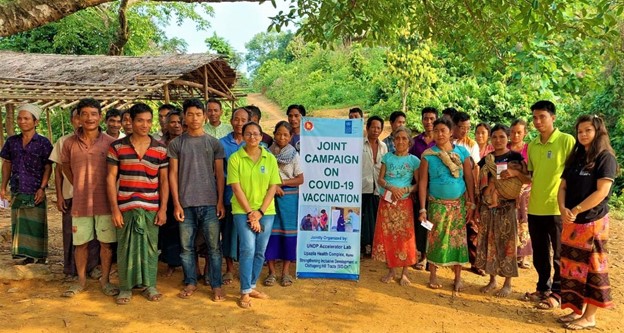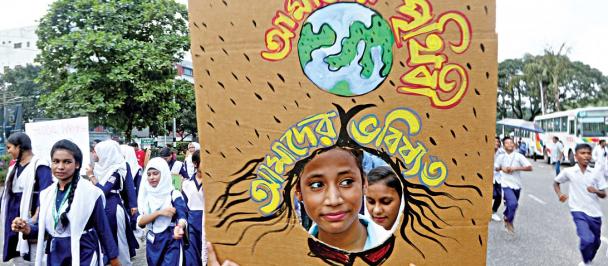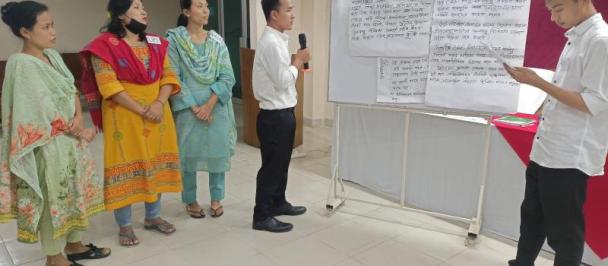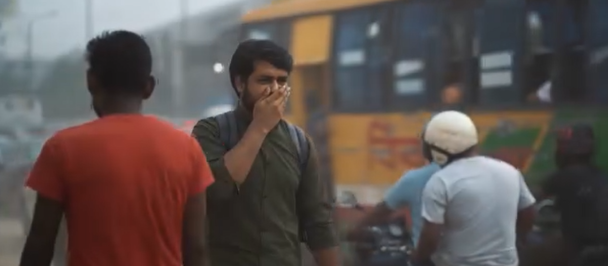COVID-19 Vaccination: Overcoming Misinformation through Sensemaking and Mobilization in the Remote areas in the Chittagong Hill Tracts
September 13, 2022
Published by:
Nazneen Ahmed, PhD, Country Economist & Head of Policy & Strategic Advisory Unit, UNDP Bangladesh
Ramiz Uddin, Head of Experimentation, Accelerator Lab Bangladesh
M M Zimran Khan, Head of Exploration, Accelerator Lab Bangladesh

Vaccine receivers join in a photo session in a hill region in Bangladesh.
The Context
In January 2022, having vaccinated almost 96 million people with the first dose of the COVID-19 vaccine, Bangladesh was well on track to reaching its global vaccination target (70% of the total population). However, the journey to achieving this milestone was not easy for the Government of Bangladesh. The country faced resistance due to the misinformation and stigma surrounding the vaccine. Reaching the remote and isolated parts of the country was a big challenge. Many people were simply not coming to the vaccine centers to take vaccines though there is no cost for COVID-19 vaccination. This write-up narrates how the Accelerator Lab of UNDP Bangladesh, through sensemaking and community mobilization initiatives, successfully contributed to overcoming misinformation around vaccination in the remote places in Chittagong hill tracts (CHT) in South-East Bangladesh.
A good number of people from various ethnic communities living in three hill districts of CHT expressed resistance to receiving the COVID-19 vaccine even after several months since the vaccination process had started. They had misconceptions regarding vaccination. For example, when told about vaccination, one villager mentioned “We would rather die than taking vaccines.” They usually take herbal medicine instead of going to hospitals or doctors to address diseases like fever or other infections.
Given the context, the UNDP Bangladesh Accelerator Lab initiated a comprehensive programme to increase COVID-19 vaccination coverage in CHT, more specifically, in four sub-districts (Thanchi, Ruma, Matiranga, Dighinala) from two remote hilly districts such as Bandarban and Khagrachari.
What did we do?
In the first stage, the Accelerator Lab consulted with Government Health Officials, administrators and other stakeholders to generate ideas on ways to implement the initiative effectively. Understanding the local community’s concerns and the stigma around the vaccination process was a must for the lab. To facilitate the process, 4 sensemaking workshops were conducted in the 4 sub-districts. The total number of participants in these workshops was about 170. Through these workshops, multiple challenges were identified those contribute to lower vaccine coverage, such as inadequate storage facilities for vaccines, transportation complexity, weak communication system, registration complexities, linguistic and cultural barriers, and superstition or disbelief. The sense-making workshops not only identified the reasons behind lower vaccine coverage but also conveyed the message of how important and safe it is to take the vaccine. The whole process was not so easy. The indigenous communities in Bangladesh have their culture and own way of living. It was challenging to make them break out of their beliefs and attitude against receiving the vaccine.
Mobilization of the community for better engagement
In coordination with the government, the lab involved the local influential personnel such as Headman (Head of Mouza or a group of villages), Karbari (Head of a village), schoolteachers, religious leaders, local influential personnel, and local government representatives to motivate the eligible unvaccinated people to receive the COVID-19 vaccine. Volunteers working for this initiative went door to door and convey the message of the importance of the COVID-19 vaccine, and the health consequences of no vaccination by showcasing festoons, posters, and miking around the remote areas.
In a workshop organized under this vaccination campaign, the Upazila Nirbahi Officer (Government Executive Officer at its local tier of administration) of Bandarban communicated to various stakeholders regarding the importance of the COVID-19 vaccine and he declared, “Those who will not take vaccines will be deprived of Government facilities. Union Council will not provide them any kind of remuneration or other facilities.” It acted as an order. It was decided that every Headman and Karbari attending the workshop would convey this message to all leaders in their villages. Ward members and Union Parishad (lowest tier in local govt.) chairman will do the same to motivate people to take the vaccine. Thus there has been sensitization among government officials as well as local level leaders. In addition, there have been community mobilization efforts where school teachers got involved.
Community workers are giving their opinions at union-level mapping meetings.
Sensemaking workshop at Khagrachari, discussing the issue of COVID-19 vaccination
The result
This whole-of-society approach to sensitization and mobilization resulted in peoples’ eagerness to get vaccinated. This is reflected in the statement made by Chetona Tripura, a 28-year-old woman living in Boalkhali Union of Dighinala sub-district said, "We had no notion of the COVID-19 vaccine that might immunize our bodies and keep us safe from the coronavirus. But when the UNDP Accelerator Lab came to our locality and briefed us about the advantages of COVID-19 vaccines, we felt relieved. Their encouraging efforts motivated me, and I demonstrated my eagerness to receive the vaccine."
Jonomoni Tripura, a local public representative living in Ruma Sadar Upazila in the Bandarban district echoed Chetona. He lives on a remote hill (44 km away from Bandarban district centre) where a vaccine center was established. His ward consists of fourteen villages. As a ward member, the villagers respect him, listen to him, and trusted him. According to Mr. Tripura “There is a huge misconception among people of this locality that if they get the vaccine, they will catch the fever and die or become sterile. The awareness campaign of the government couldn’t reach the people in this remote area to get the vaccine”.
As the motivational program went successful with the help of Jonomoni Tripura, the villagers started showing up at the vaccination center in groups. The team was able to immunize about 50 residents of this area with his help. Most of them belonged to the local ethnic communities. Everyone took the vaccine eagerly and with a smile on their faces.
Thanks to the financial support of the Japan Supplementary Budget (JSB) and the partners of Accelerator Lab Bangladesh especially the government’s Health and Family Planning Department, Office of Civil Surgeon, Social Service Department of Government, Bangladesh Red Crescent Society, Office of Sub-district Administrator, Chittagong Hill Tracts District Council and Strengthening Inclusive Development in Chittagong Hill Tracts (SID-CHT) Project of UNDP Bangladesh for coming forward in partnership with UNDP Accelerator Lab Bangladesh.

 Locations
Locations


